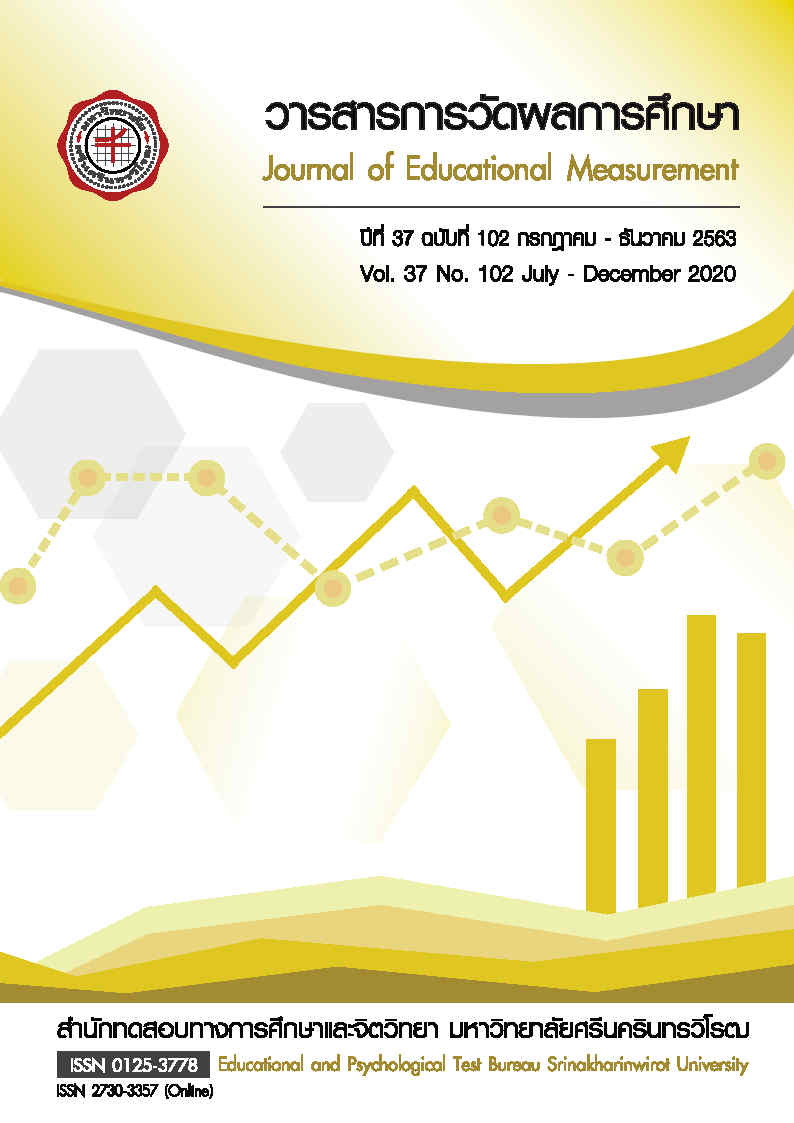การพัฒนาองค์ประกอบพหุระดับของทักษะศตวรรษ 21 ของนักศึกษาระดับปริญญาตรีในประเทศราชอาณาจักรกัมพูชา
คำสำคัญ:
ทักษะศตวรรษที่ 21, ทักษะการเรียนรู้และนวัตกรรม, ทักษะสารสนเทศ, การใช้สื่อ และ เทคโนโลยี, ทักษะชีวิตและอาชีพบทคัดย่อ
การวิจัยครั้งนี้มีวัตถุประสงค์ เพื่อพัฒนาแบบจำลองทักษะในศตวรรษที่ 21 โดย 1) เพื่อพัฒนาโมเดลองค์ประกอบเชิงยืนยันพหุระดับของทักษะศตวรรษที่ 21 ของนักศึกษาระดับปริญญาตรีในระดับนักศึกษาและระดับวิชา และ 2) เพื่อทดสอบความตรงเชิงโครงสร้างองค์ประกอบเชิงยืนยันพหุระดับของทักษะศตวรรษที่ 21 ของนักศึกษาระดับปริญญาตรีกับข้อมูลเชิงประจักษ์ โดยใช้การวิจัยแบบผสานวิธีขั้นตอนตามลำดับ เครื่องมือที่ใช้ในการเก็บรวบรวมข้อมูลเป็นแบบสอบถาม กลุ่มตัวอย่างเป็นนักศึกษาระดับปริญญาตรีชาวกัมพูชาจำนวน 500 คนปีการศึกษา 2561-2562 ตามการสุ่มแบบหลายขั้นตอน
ผลการวิจัย พบว่า การวิเคราะห์องค์ประกอบเชิงยืนยันพหุระดับของทักษะศตวรรษที่ 21
ของนักศึกษาระดับปริญญาตรีประกอบด้วยองค์ประกอบหลักสามประการคือ 1) การเรียนรู้และนวัตกรรม มีดังนี้ ทักษะความคิดสร้างสรรค์และนวัตกรรม ทักษะการคิดอย่างมีวิจารณญาณ และทักษะการแก้ปัญหาทักษะการสื่อสารและการทำงานร่วมกัน 2) ทักษะความรู้สารสนเทศ สื่อ และเทคโนโลยี มีดังนี้ ทักษะ การรู้สารสนเทศ ทักษะการรู้สื่อ และทักษะการรู้สารสนเทศ การสื่อสาร และเทคโนโลยี 3) ทักษะชีวิตและอาชีพ มีดังนี้ ทักษะความยืดหยุ่นและความสามารถในการปรับตัว ทักษะความคิดริเริ่มและทักษะ
การกำกับตนเองทักษะทางสังคมและข้ามวัฒนธรรม ทักษะการเพิ่มผลผลิตและความรับผิดชอบ และทักษะความเป็นผู้นำและความรับผิดชอบ
โมเดลที่พัฒนาขึ้นมีความสอดคล้องกับข้อมูลเชิงประจักษ์พิจารณาจากc2 = 68.316, df = 43, (c2 /df) = 1.589, RMSEA = .034, CFI = .994, TLI = .984 ค่าสัมประสิทธิ์การทำนายค่า R2 ที่ระดับนักเรียนอยู่ระหว่าง. 376 ถึง. 940 และระดับวิชา อยู่ระหว่าง. 268 ถึง .997 3) การพัฒนาทักษะ
ในศตวรรษที่ 21 ของนักศึกษาระดับปริญญาตรีประกอบด้วย 3 องค์ประกอบหลัก
เอกสารอ้างอิง
Dyer, N. G., Hanges, P. J., & Hall, R. J. (2005). Applying multilevel confirmatory factor analysis techniques to the study of leadership. The leadership quarterly, 16(1), 149-167.
Edmonds, W. A., & Kennedy, T. D. (2017). An applied guide to research designs: Quantitative, qualitative, and mixed methods: Sage Publications.
George, D., & Mallery, P. (2016). IBM SPSS statistics 23 step by step: A simple guide and reference: Routledge.
Germaine, R., Richards, J., Koeller, M., & Schubert-Irastorza, C. (2016). Purposeful Use of 21st Century Skills in Higher Education. Journal of Research in Innovative Teaching. 9 (1).
Griffin, P., & Care, E. (2015). Assessment and teaching of 21st century skills: Methods and approach: Springer.
Hair, J. F., Black, W. C., Babin, B. J., & Anderson, R. E. (2014). Multivariate Data Analysis: Pearson New International Edition. In (7th ed.). London: Pearson Education Limited.
Heckman, J. J., & Corbin, C. O. (2016). Capabilities and Skills. Journal of Human Development and Capabilities, 17(3), 342-359. doi:10.1080/19452829.2016.1200541
Hooper, D., Coughlan, J., & Mullen, M. (2008). Structural equation modelling: Guidelines for determining model fit. Articles, 6(1), 53-60.
Hox. (2002). Multilevel analysis: Techniques and applications. Mahwah, New Jersey: Lawrence Erlbaum Associates.
Kline, R. B. (2005). Principles and practice of structural equation modeling (2nd ed.). New York: Guilford publications.
Majid, S., Liming, Z., Tong, S., & Raihana, S. (2012). Importance of soft skills for education and career success. International Journal for Cross-Disciplinary Subjects in Education. 2 (2). 1037-1042.
MoEYS. (2016). A Guided Book for Sellecting the Institution an Major to study in Higher Education. Phnom Penh: Ministry of Education Youth and Sport (Khmer Language).
Partnership. (2008). 21st Century Skills, Education & Competitiveness: A Resource and Policy Guide.
Partnership. (2009). Framework for 21st century learning. In. Washington, DC: Prtnership.
PhnomPenhpost. (2018). Reimagining education’ to face 21st century challenges, says Princess Beatrice of York. Phnom Penh Post.
Polit, D., & Beck, T. (2006). The content validity index: Are you sure you know what's being reported? Critique and recommendations. Research in nursing & health, 29(5), 489-497.
Polit, D., Beck, T., & Owen, S. (2007). Focus on research methods is the CVI an acceptable indicator of content validity. Res Nurs Health, 30, 459-467.
Prihatiningsih, S. (2018). A Review of Soft-skill Needs in in Terms of Industry. Paper presented at the IOP Conference Series: Materials Science and Engineering.
Richardson, Nash, J. B., & Flora, K. L. (2014). Unsystematic technology adoption in Cambodia: Students’ perceptions of computer and internet use. International Journal of Education and Development using ICT. 10 (2). 63-76.
Schulz, B. (2008). The importance of soft skills: Education beyond academic knowledge. Journal of Language and Communication. 2. 146-154.
Trilling, B., & Fadel, C. (2009). 21st century skills: Learning for life in our times (1st ed.). San Francisco: John Wiley & Sons.
Vong, S., & Wareerat, K. (2016). Exploration of critical thinking of trainee students at regional teacher training center in Takeo province, Cambodia. Journal of Community Development Research (Humanities and Social Sciences). 9 (1). 33-45.
WorldBank. (2006). World development report 2007: Development and the next generation. Washington, DC: WorldBank.
WorldBank. (2010). Providing Skills for Equity and Growth: Preparing Cambodia's Youth for the Labor Market. Washington, DC: World Bank.



